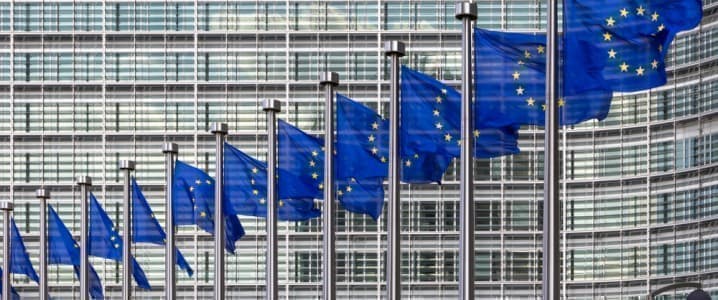The European Union's eighth sanctions package on Russia over its war in Ukraine was officially adopted on October 6 after gaining final approval the previous day, the bloc's executive arm said. The package, which was formalized on October 6 in the absence of any objections from the 27 EU members, is meant to deprive Moscow of billions of euros in revenues from the sale of products that the EU says generate significant revenues for Russia.
The European Commission welcomed the adoption of what it called fresh hard-hitting sanctions against Russia for its aggression against Ukraine.
"This package -- which has been closely coordinated with our international partners -- responds to Russia's continued escalation and illegal war against Ukraine, including by illegally annexing Ukrainian territory based on sham 'referenda,' mobilizing additional troops, and issuing open nuclear threats," the commission said in a statement.
The new sanctions, which the bloc says will deprive Russia of a further 7 billion euros ($6.9 billion) in revenues, extend a ban on imports from Russia of steel and steel products, imports of wood pulp and paper, imports of machinery and appliances not yet covered by existing sanctions. They also extend a ban on imports of intermediate chemicals, plastics, and cigarettes.
Additionally, the sanctions ban the export of EU goods used in aviation, such as tires and brakes, and they extend a ban on the export of electric components, including certain semiconductors and less sophisticated components than those already banned.
In addition, the sanctions ban the export of certain chemical substances, nerve agents, and goods that have “no practical use other than for capital punishment, torture or other cruel, inhuman or degrading treatment or punishment.”
The sanctions also target more individuals at the Russian Defense Ministry, people involved in Moscow's referendum votes in occupied parts of four regions of Ukraine, and those participating in evading sanctions.
Related: Trading Giants Expect Robust Oil Demand Despite Recession Fears
Notably, the eighth package of punitive measures includes a ban on EU citizens sitting on the boards of Russian state companies.
"Russia should not benefit from European knowledge and expertise," the commission said, in an apparent nod to popular outrage over the cases of Gerhard Schroeder and Francois Fillon -- former top European politicians who subsequently took jobs on Russian boards.
The EU said it was motivated to impose the sanctions by Russia’s repeated threat to use weapons of mass destruction, a reference to Putin’s comments that he would defend Russian territory “with any means at our disposal.”
The sanctions stop short of imposing measures sought by Poland and the Baltic states, including a complete ban on nuclear energy cooperation, diamond imports, and the blacklisting of Patriarch Kirill, head of the Russian Orthodox Church.
"The package could have been far stronger," said Andrzej Sados, Poland's ambassador to the EU. "But given that we require unanimity...it is important that we have this strong response to Russia's latest aggressive steps."
The new sanctions package also includes a price cap on maritime transport to third countries of Russian crude oil. It does not affect the exceptions allowing certain EU member states to continue importing crude oil and petroleum products from Russia by pipeline.
By RFE/RL
More Top Reads From Oilprice.com:
- High Energy Prices Push UK Construction Industry To The Brink
- DoE Scientists Reveal New Process At Tokamak Fusion Reactor
- Central Banks Are Stocking Up On Gold



















1- The resilience of the Russian economy. Russia’s economy won’t only survive the harshest and most comprehensive Western sanctions but it could possibly emerge from the Ukraine conflict in far better shape than the economies of the Western nations imposing the sanctions.
2- Russia’s economy is far better prepared to withstand the sanctions than in the aftermath of the annexation of the Crimea in 2014 when global oil prices collapsed.
3- In the aftermath of the 2014 sanctions Russia embarked on an extensive diversification of the economy. As a result, Russia’s economy has become almost totally self-sufficient. Russia doesn’t virtually need to import anything. That is why the purchasing power of the ruble inside Russia has remained intact and its trade surplus has risen to $180 bn in the first 8 months of this year compared to $120 in 2021.
4- Russia’s unique position as a major net exporter of both energy and key foodstuffs that has allowed it to stay afloat. Its strong trading relations with both China and India the world’s largest and third largest economies respectively based on PPP have ensured that plenty of foreign currency is flowing into Russia. Russia’s trade with China has risen from $13 bn in 2011 to more than $150 bn in the first 8 months of 2022.
5- Russia neither needs Western technology nor its finance. It has both as has been shown by its development of the Arctic huge oil and gas resources.
Dr Mamdouh G Salameh
International Oil Economist
Global Energy Expert